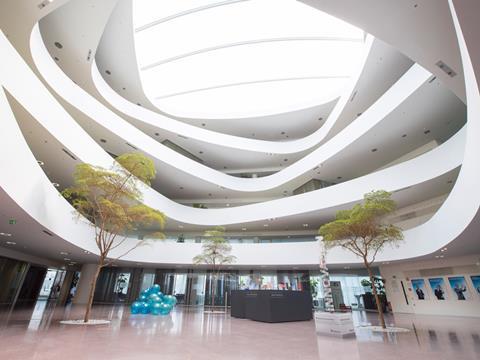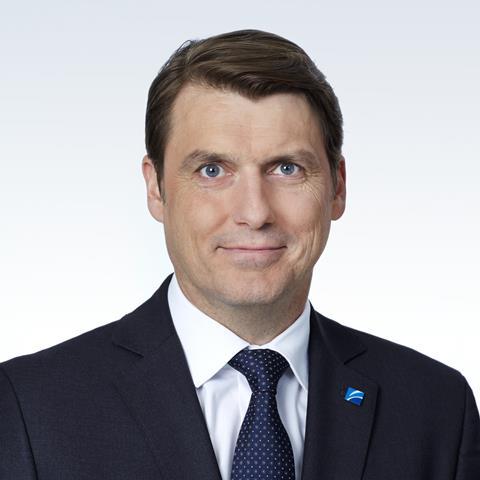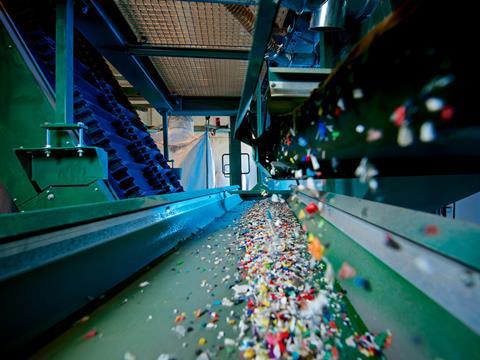In the second of our series of interviews with sponsors of the Sustainability Awards 2018, Günter Stephan, head of circular economy at Borealis, shares with Tim Sykes his vision for helping realise circularity in plastics.

Tim Sykes:
How do you see the core sustainability challenges facing plastic packaging?
Günter Stephan:
From our point of view there are two major challenges when it comes to the packaging sustainability. The first are the limitations around recycling technologies for polyolefin-based packaging. For instance, if they are used for food packaging, at the moment polyolefin materials can’t be recycled back into new food packaging. The second key challenge is that recycling polyolefins and plastics in general is not very profitable compared with virgin polymers. So we really need to overcome these technological / profitability challenges in order to achieve a step-change in sustainability of packaging.
Perhaps more fundamentally, the world needs to adopt a mindset that throwing away plastics is a bad idea, because it’s too valuable a resource. Unfortunately, the perception that polyolefins are raw materials that ought to go in the recycling bin (like glass, aluminium, sometimes PET bottles) is not yet widespread. At the moment too many plastics are going into the other waste stream, so they have a linear, rather than circular, life. We need to change perceptions. Our vision is that plastic waste should come to be regarded as a new feedstock for producing polyolefins.

Tim Sykes:
This is a huge and multi-faceted task. Do you believe that meeting our shared sustainability goals require cross-industry and cross-societal collaboration?
Günter Stephan:
This is an area where we at Borealis feel we can be a game changer, because we are sitting right in the middle of the value chain. In terms of cross-industry collaboration, we have been teaming up with brand owners and major converters for many years. So we already have a good platform for downstream collaboration, which can be translated in order to address the demands of recycling.
Collaboration with brand owners is also crucial when it comes to design for recyclability. This has two aspects. First of all, packaging needs to be designed to ensure that it is 100 per cent empty when it goes into the waste stream. If, for example, there is always some toothpaste left in the tube, it reduces the quality of the recyclate, influences the smell, etc. If we work with the brand owners, we have all the tools to achieve this goal. The second aspect is switching from multilayer to monolayer films that are easier to recycle.
Meanwhile, considering the upstream side, I think collaboration is absolutely required with waste collectors and sorters, but also with the local municipalities. These are the stakeholders who are ‘sitting on the waste’ and we need to work with them to get access to plastics waste in the right quantity and the right quality.
As far as cross-societal collaboration, I think we also need to team up with municipalities and help them with the challenges of extracting valuable plastics from the waste stream. In addition, there’s an important collective task in changing those widespread perceptions that plastic isn’t something for the recycling stream.
Borealis is very active in promoting collaboration through organisations such as PCEP (the Polyolefin Circular Economy Platform) and the Ellen MacArthur Foundation, and we’re highly engaged in discussions at EU level.
Tim Sykes:
Is part of the challenge about nurturing new business models?
Günter Stephan:
Yes, we need to create new business models and new supply chains. For instance, we are transporting bales of waste from one part of Europe to another, meaning we are shipping a lot of air. There’s an opportunity to change the business model there. If the plastics sorter could reduce that material to flakes close to the point of collection it would be more cost efficient and more sustainable to transport. This is one area where I think we can design a more sustainable business model.
However, to support these we also need to create demand for this recycled material, and that’s an area where we have a real opportunity to make a difference.

Tim Sykes:
What are the opportunities for business growth in offering transformative innovation that meets the technical challenges you have outlined?
Günter Stephan:
Sustainability is our social responsibility, and both Borealis and everyone across the industry have to accept this responsibility. This is the starting point. But beyond this we can identify a business opportunity to make products out of recycled materials, out of plastic waste, that are better quality than previously possible. We don’t really need any more park benches made from recycled materials, but we can create higher value applications.
Borealis has a long record of accomplishment of developing plastics with more and more useful properties. We’ve achieved that on the virgin side, and we’re convinced that we can do this with recycled plastics as well. The goal is to have a situation where converters make no differentiation between the quality of virgin and recycled plastics: they simply meet the customer’s expectations.
So the business opportunity is to move to the next level of applications in order to make plastics truly circular. This means for instance creating recycled feedstocks that can be used for food packaging, where at the moment their smell or colour or mechanical properties render them unsuitable. We’ll need to bring to market technologies to overcome these challenges.
Tim Sykes:
How do you see the present and future role of Borealis R&D in this context?
Günter Stephan:
We acquired the recycling business mtm plastics based in Niedergebra, Germany, in 2016 – a technology leader in the recycling of mixed post-consumer plastic waste and a major mechanical recycler of PE and PP. The focus of the R&D we are conducting there is enhancing the product portfolio with new applications: blending with virgin materials, developing new compounds, better mechanical properties.
The vision is to reach a ‘Recycling 2.0’. Mechanical recycling is the backbone but we also want to develop complementary technologies to enhance the properties of the recyclate. We are very busy with innovation around chemical recycling, which we see as an add-on to the existing methods. The central challenge we are working on is upscaling technologies that are proven at the laboratory level to industrial volumes. To put this in context, plastics waste now stays in Europe following China’s decision to cease imports, so there’s an urgent need to translate recycling technologies to industrial plant scale.
Linked to this, if you have a different recycling technology, you also need a feedstock concept to support it. At the moment we are dealing with mixed PE / PP waste coming in bales to Niedergebra for processing. This requires a change in the feedstock set-up. It comes back to the question of making it a profitable proposition across the value chain. This depends on being able to convert it to mid- to higher-end applications that match virgin material capabilities.

















